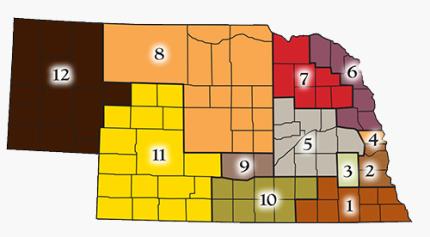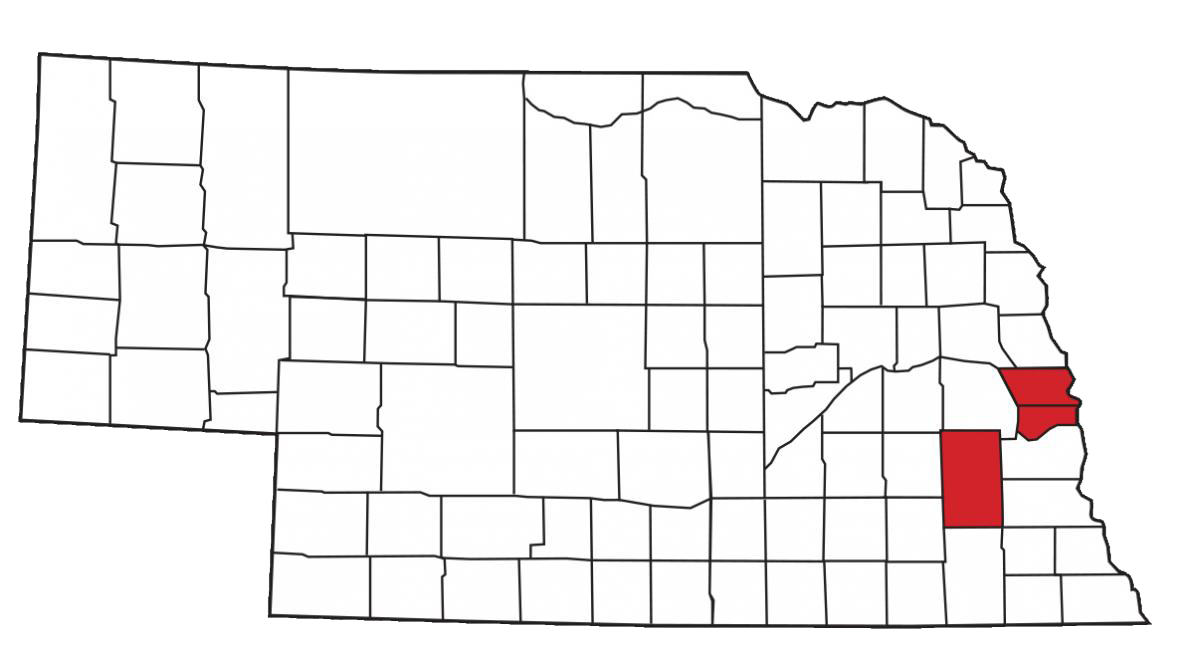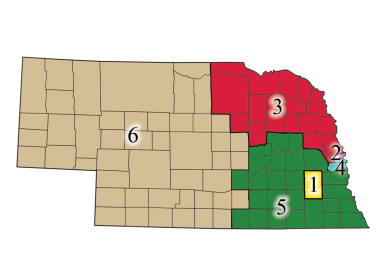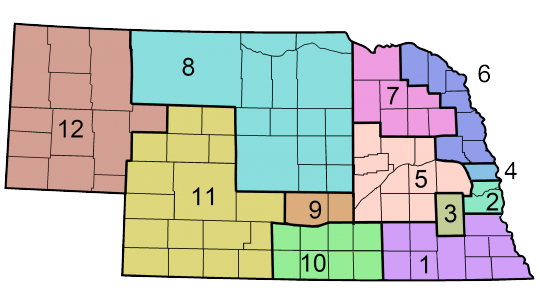E-Manual for Judicial Resources Commissioners
Resources
- Commission Member List
- Minutes of the Judicial Resources Commission
- Judicial Resources Commission Rules
- Caseload Reports
- County Court
- District Court
- Separate Juvenile Court
Statutes Governing Judicial Resources Commission
24-1201 - Judicial Resources Commission; created; membership; quorum.
There is hereby created the Judicial Resources Commission consisting of: (1) Four judges, including one district court judge, one county court judge, one separate juvenile court judge, and one Justice or judge of the Supreme Court, all of whom shall be appointed by the Supreme Court; (2) one member of the Nebraska State Bar Association from each of the six judicial districts prescribed in Article V, section 5, of the Constitution of Nebraska who shall have practiced law in this state for at least ten years and who shall be appointed by the Executive Council of the Nebraska State Bar Association; and (3) one citizen from each of the six judicial districts prescribed in Article V, section 5, of the Constitution of Nebraska appointed by the Governor and one additional citizen who shall be appointed at large, none of whom shall be (a) a justice or judge of the Supreme Court or a judge of any other court, active or retired, (b) a member of the Nebraska State Bar Association, or (c) an immediate family member of any person listed in subdivisions (a) and (b) of this subdivision. The Justice or judge of the Supreme Court serving on the commission shall also serve as chairperson of the commission. A majority of the members of the commission shall constitute a quorum for the transaction of business. The commission shall act by a vote of the majority of its members.
24-1202 - Judicial Resources Commission; term; vacancy.
The term of office of each member of the Judicial Resources Commission shall be six years. In the event of a vacancy, the vacancy shall be filled by appointment in the same manner as the original member was appointed, and the individual so appointed shall serve for the balance of the original term. Any member of the commission shall be eligible for reappointment for an additional term without regard to the number of years that such individual has served as a member of the commission.
24-1203 - Judicial Resources Commission; expenses.
24-1204 - Existence of judicial vacancy; determination.
24-1204.
Existence of judicial vacancy; determination.
In the event of the death, retirement, resignation, or removal of a district, county, or separate juvenile judge or the failure of a district, county, or separate juvenile judge to be retained in office or upon the request of a majority of the members of the Judicial Resources Commission, the commission shall, after holding a public hearing, determine whether a judicial vacancy exists in the affected district or any other judicial district or whether a new judgeship or change in number of judicial districts or boundaries is appropriate. If the commission determines a vacancy exists in a district or county court district, the commission may also make a recommendation to the Supreme Court of the site for a primary office location. The public hearing may include videoconferencing, or if the judicial workload statistics compiled pursuant to section 24-1007 indicate a need for a number of judges equal to or greater than the number currently authorized by law, the commission may conduct a hearing by telephone conference. If a telephone conference is used, a recording shall be made of the telephone conference and maintained by the commission for at least one year and the telephone conference shall conform to the requirements of subsection (2) of section 84-1411, and the commission shall only determine whether a judicial vacancy exists in the affected district and make no other determinations.
24-1205 - Judgeships; annual hearing; recommendations.
By December 15, 1995, and each year thereafter, the Judicial Resources Commission shall hold a hearing to determine whether (1) a new judgeship is appropriate in any judicial district or a reduction in judgeships is appropriate in any judicial district or (2) the judicial district boundaries or the number of judicial districts should be changed for the district or county courts. The commission shall also examine current caseload statistics and make any appropriate recommendations for the more balanced use of existing judicial resources. The State Court Administrator shall provide adequate administrative support and information as requested by the commission. A report of this hearing and any recommendations shall be filed by the commission with the Legislature, the Governor, and the Supreme Court on or before December 31 of each year. The report submitted to the Legislature shall be submitted electronically.
24-1206 - Commission; basis for determination; report to Legislature; legislative action.
(1) The Judicial Resources Commission's determination of whether a judicial vacancy exists or a new judgeship, a reduction in judgeships, a change in number of judicial districts or boundaries, or the reallocation of a judgeship from a district, county, or separate juvenile court in one judicial district to a district, county, or separate juvenile court in another judicial district is appropriate pursuant to section 24-1204 or 24-1205 shall be based upon (a) its analysis of judicial workload statistics compiled pursuant to section 24-1007, (b) whether litigants in the judicial district have adequate access to the courts, (c) the population of the judicial district, (d) other judicial duties and travel time involved within the judicial district, and (e) other factors determined by the Supreme Court to be necessary to assure efficiency and maximum service. The State Court Administrator shall provide adequate administrative support and information as requested by the commission.
(2) After making a determination, the commission shall report the results electronically to the Legislature and recommend any legislative changes which are needed. If no changes in existing law are needed and none are recommended by the commission, no legislative action shall be necessary to fill any judicial vacancy determined to exist. The Legislature shall not create a new judgeship unless the commission recommends the creation of a new judgeship in its report. If legislative action is required but none is taken in the first legislative session commencing after receipt of the report by the Legislature, the commission shall hold another hearing on the matter and shall determine whether a judicial vacancy exists or again recommend legislative changes to the Legislature in its report.
24-1007 - State Court Administrator; compile judicial workload statistics; how; juveniles in Nebraska's justice system; annual report; contents.
(1) The State Court Administrator shall compile uniform and accurate statistics which will assist in the evaluation of judicial workloads. The judicial workload statistics shall be based on caseload numbers weighted by category of case. The judicial workload statistics shall be compiled annually for each district, county, and separate juvenile court judicial district in the state.
(2) The State Court Administrator shall develop and provide an annual report to the Legislature and the Governor on juveniles in Nebraska's justice system. The report to the Legislature shall be provided electronically. For purposes of this section, juvenile has the same meaning as in section 43-245. The report shall include, but not be limited to, geographic and demographic information on the following:
(a) Juveniles prosecuted in juvenile court under subdivision (1), (2), (3)(b), or (4) of section 43-247, including the total number of filings and adjudications;
(b) Juveniles prosecuted in adult criminal court for felonies, misdemeanors, and traffic offenses. The information shall include juveniles sentenced to terms in adult jails and prisons and juveniles placed on adult probation;
(c) The number of motions to transfer and the number of cases transferred to adult court from juvenile court and from adult criminal court to juvenile court;
(d) Juveniles placed on juvenile probation, the number of juveniles on probation in out-of-home care, the number of juveniles completing probation, the number of motions to revoke probation and probation revocations, and the average length of time on probation;
(e) Juveniles with and without access to counsel in juvenile and adult court, both appointed and retained; and
(f) Rates of recidivism.
24-809.04 - Judicial vacancy; date of final determination.
For purposes of sections 24-809.05 and 24-810, the date of a final determination of a district, county, or separate juvenile court judicial vacancy shall be:
(1) The date a judicial vacancy is determined by the Judicial Resources Commission pursuant to section 24-1204 or 24-1206; or
(2) If a determination is made by the commission that a move of a judgeship from one district to another or between county and district court, a new judgeship, or a change in number of judicial districts or boundaries is appropriate pursuant to section 24-1204 or 24-1205, the date the Governor approves legislation or the Legislature overrides a veto of legislation creating or moving a judicial vacancy.
84-1411 - Meetings of public body; notice; contents; when available; right to modify; duties concerning notice; videoconferencing or telephone conferencing authorized; emergency meeting without notice; appearance before public body.
(1) Each public body shall give reasonable advance publicized notice of the time and place of each meeting by a method designated by each public body and recorded in its minutes. Such notice shall be transmitted to all members of the public body and to the public. Such notice shall contain an agenda of subjects known at the time of the publicized notice or a statement that the agenda, which shall be kept continually current, shall be readily available for public inspection at the principal office of the public body during normal business hours. Agenda items shall be sufficiently descriptive to give the public reasonable notice of the matters to be considered at the meeting. Except for items of an emergency nature, the agenda shall not be altered later than (a) twenty-four hours before the scheduled commencement of the meeting or (b) forty-eight hours before the scheduled commencement of a meeting of a city council or village board scheduled outside the corporate limits of the municipality. The public body shall have the right to modify the agenda to include items of an emergency nature only at such public meeting.
(2) A meeting of a state agency, state board, state commission, state council, or state committee, of an advisory committee of any such state entity, of an organization created under the Interlocal Cooperation Act, the Joint Public Agency Act, or the Municipal Cooperative Financing Act, of the governing body of a public power district having a chartered territory of more than one county in this state, of the governing body of a public power and irrigation district having a chartered territory of more than one county in this state, of a board of an educational service unit, of the Educational Service Unit Coordinating Council, of the governing body of a risk management pool or its advisory committees organized in accordance with the Intergovernmental Risk Management Act, or of a community college board of governors may be held by means of videoconferencing or, in the case of the Judicial Resources Commission in those cases specified in section 24-1204, by telephone conference, if:
(a) Reasonable advance publicized notice is given;
(b) Reasonable arrangements are made to accommodate the public's right to attend, hear, and speak at the meeting, including seating, recordation by audio or visual recording devices, and a reasonable opportunity for input such as public comment or questions to at least the same extent as would be provided if videoconferencing or telephone conferencing was not used;
(c) At least one copy of all documents being considered is available to the public at each site of the videoconference or telephone conference;
(d) At least one member of the state entity, advisory committee, board, council, or governing body is present at each site of the videoconference or telephone conference; and
(e) No more than one-half of the state entity's, advisory committee's, board's, council's, or governing body's meetings in a calendar year are held by videoconference or telephone conference.
Videoconferencing, telephone conferencing, or conferencing by other electronic communication shall not be used to circumvent any of the public government purposes established in the Open Meetings Act.
(3) A meeting of a board of an educational service unit, of the Educational Service Unit Coordinating Council, of the governing body of an entity formed under the Interlocal Cooperation Act, the Joint Public Agency Act, or the Municipal Cooperative Financing Act, of the governing body of a risk management pool or its advisory committees organized in accordance with the Intergovernmental Risk Management Act, of a community college board of governors, of the governing body of a public power district, of the governing body of a public power and irrigation district, or of the Nebraska Brand Committee may be held by telephone conference call if:
(a) The territory represented by the educational service unit, member educational service units, community college board of governors, public power district, public power and irrigation district, Nebraska Brand Committee, or member public agencies of the entity or pool covers more than one county;
(b) Reasonable advance publicized notice is given which identifies each telephone conference location at which an educational service unit board member, a council member, a member of a community college board of governors, a member of the governing body of a public power district, a member of the governing body of a public power and irrigation district, a member of the Nebraska Brand Committee, or a member of the entity's or pool's governing body will be present;
(c) All telephone conference meeting sites identified in the notice are located within public buildings used by members of the educational service unit board, council, community college board of governors, governing body of the public power district, governing body of the public power and irrigation district, Nebraska Brand Committee, or entity or pool or at a place which will accommodate the anticipated audience;
(d) Reasonable arrangements are made to accommodate the public's right to attend, hear, and speak at the meeting, including seating, recordation by audio recording devices, and a reasonable opportunity for input such as public comment or questions to at least the same extent as would be provided if a telephone conference call was not used;
(e) At least one copy of all documents being considered is available to the public at each site of the telephone conference call;
(f) At least one member of the educational service unit board, council, community college board of governors, governing body of the public power district, governing body of the public power and irrigation district, Nebraska Brand Committee, or governing body of the entity or pool is present at each site of the telephone conference call identified in the public notice;
(g) The telephone conference call lasts no more than two hours; and
(h) No more than one-half of the board's, council's, governing body's, committee's, entity's, or pool's meetings in a calendar year are held by telephone conference call, except that a governing body of a risk management pool that meets at least quarterly and the advisory committees of the governing body may each hold more than one-half of its meetings by telephone conference call if the governing body's quarterly meetings are not held by telephone conference call or videoconferencing.
Nothing in this subsection shall prevent the participation of consultants, members of the press, and other nonmembers of the governing body at sites not identified in the public notice. Telephone conference calls, emails, faxes, or other electronic communication shall not be used to circumvent any of the public government purposes established in the Open Meetings Act.
(4) The secretary or other designee of each public body shall maintain a list of the news media requesting notification of meetings and shall make reasonable efforts to provide advance notification to them of the time and place of each meeting and the subjects to be discussed at that meeting.
(5) When it is necessary to hold an emergency meeting without reasonable advance public notice, the nature of the emergency shall be stated in the minutes and any formal action taken in such meeting shall pertain only to the emergency. Such emergency meetings may be held by means of electronic or telecommunication equipment. The provisions of subsection (4) of this section shall be complied with in conducting emergency meetings. Complete minutes of such emergency meetings specifying the nature of the emergency and any formal action taken at the meeting shall be made available to the public by no later than the end of the next regular business day.
(6) A public body may allow a member of the public or any other witness other than a member of the public body to appear before the public body by means of video or telecommunications equipment.

County Court

Separate Juvenile Court


 District Court
District Court